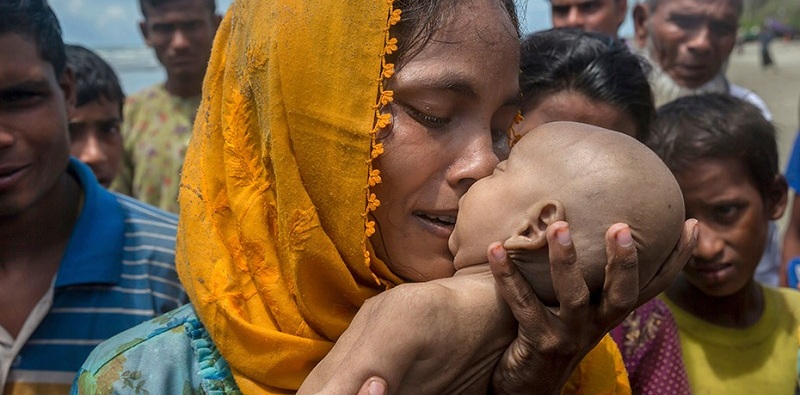Alwaght-The head of the UN refugee agency said on Saturday he was shocked by the “terrible violence” inflicted on Rohingya refugees fleeing ethnic cleansing and genocide in Myanmar.
Over 429,000 Rohingya Muslims have fled to Bangladesh since Aug. 25, when Myanmar regime forces and extremist Buddhist started a new wave of crackdown that the United Nations has termed as ethnic cleansing. The recent exodus of Rohingya has brought the number of refugees from Rakhine living in Bangladesh to over 800,000.
During a visit to the sprawling Kutapalong refugee camp in southeastern Bangladesh, close to the Myanmar border, the United Nations High Commissioner for Refugees, Filippo Grandi, said Rohingyas had told him their stories.
“I was really struck by the fear that these people carry with themselves, what they have gone through and seen back in Myanmar,” he said in the camp, where refugees live under thousands of tarpaulins covering the hills and rice paddies.
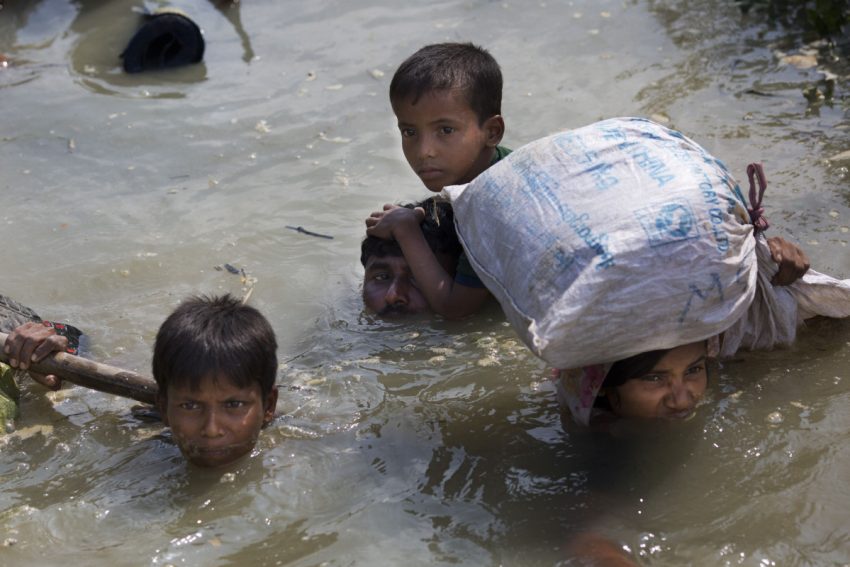 Muslims fleeing ethnic violence in Myanmar crossing a flooded river
Muslims fleeing ethnic violence in Myanmar crossing a flooded river “Parents killed, families divided, wounds inflicted, rapes perpetrated on women. There’s a lot of terrible violence that has occurred and it will take a long time for people to heal their wounds, longer than satisfying their basic needs,” Grandi said.
The speed and scale of the exodus from Myanmar has left hundreds of thousands living in dire conditions in a poor part of a poor country, and UN and aid agencies are scrambling to give people shelter, get them fed and prevent an outbreak of disease.
A senior UN official said on Friday that an estimated $200 million would be needed to help the refugees in Bangladesh for six months. Aid workers fear a humanitarian crisis is also unfolding in Rakhine state, though Myanmar has restricted access.
Myanmar de facto leader and noble laureate Aung San Suu Kyi has faced a barrage of international criticism over their plight, for condoning the ethnic cleansing.
Villages Burning
Meanwhile, Amnesty International has said new satellite images and videos from Myanmar’s strife-torn Rakhine state show smoke rising from Rohingya Muslim villages contradicting Aung San Suu Kyi’s claims that military operations there have ended.
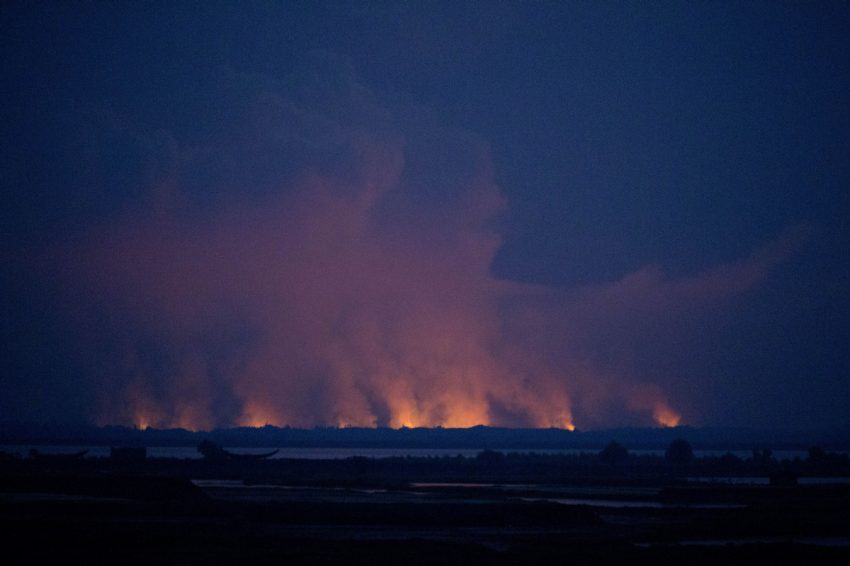 Witnesses in Bangladesh report seeing Muslim villages burning in Myanmar
Witnesses in Bangladesh report seeing Muslim villages burning in MyanmarThe London-based group said its sources in Rakhine claim the fires – captured in images as recently as Friday afternoon – were started by members of the Myanmar security forces and extremists Buddhist mobs.
“This damning evidence from the ground and from space flies in the face of Aung Suu Kyi’s assertions to the world,” Tirana Hasan, Amnesty’s director of crisis response, said in a statement late Friday.
“According to eyewitness accounts, photographic evidence, and multiple reports, antipersonnel mines have been laid between Myanmar’s two major land crossings with Bangladesh, resulting in casualties among Rohingya refugees fleeing government attacks on their homes,” the group said.
It demanded that Myanmar immediately cease using such weapons and accede to the 1997 Mine Ban Treaty, to which 162 other nations are parties
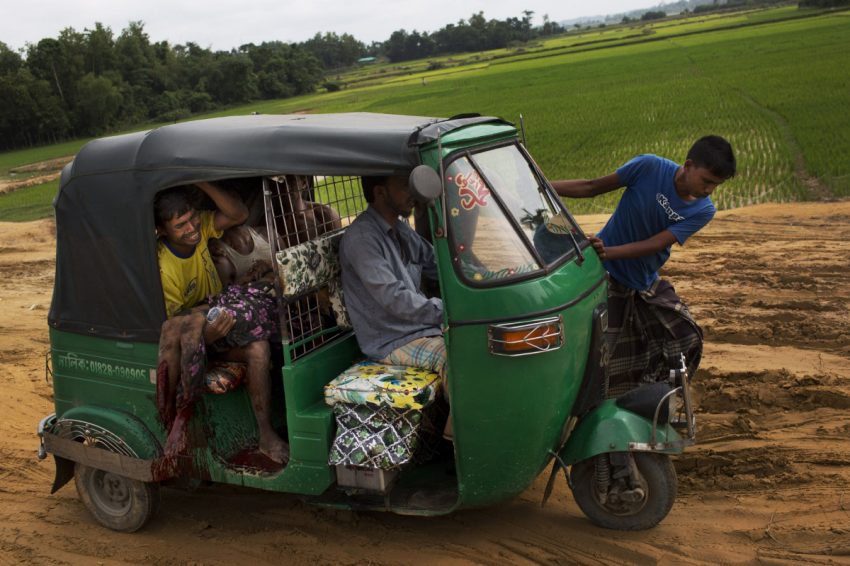 A rickshaw carrying a Muslim woman who had stepped on an explosive planted by Myanmar's army that blew off her right leg
A rickshaw carrying a Muslim woman who had stepped on an explosive planted by Myanmar's army that blew off her right legMilitary lay landmine at on Bangladesh Border
Myanmarese security forces have laid landmines during attacks on villages and along the Bangladesh border, posing a grave risk to Rohingya Muslims fleeing atrocities, Human Rights Watch said on Saturday.
“The dangers faced by thousands of Rohingya fleeing atrocities in Burma are deadly enough without adding landmines to the mix,” said Meenakshi Ganguly, Human Rights South Asia director, referring to the Buddhist country as Burma. “The Burmese military needs to stop using these banned weapons, which kill and maim without distinction.”
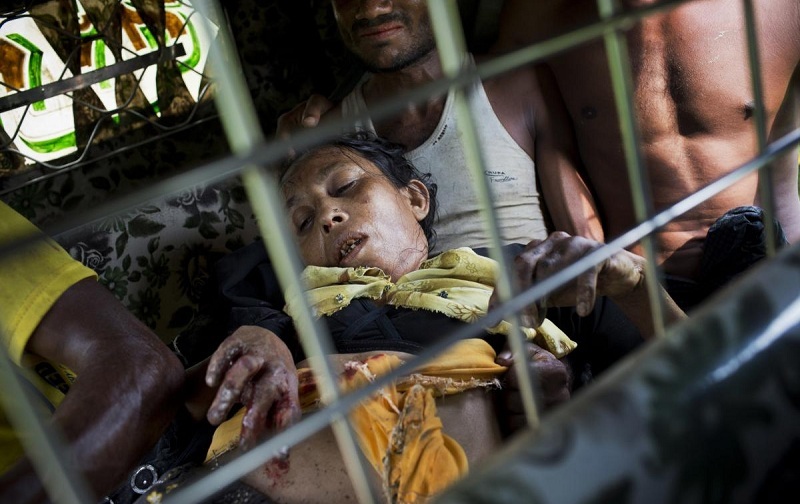
A Rohingya woman travels to a hospital near Kutupalong, Bangladesh, after a landmine blew off her right leg while she was crossing the border from Myanmar. (Photo: AP September 4, 2017)
According to witness accounts, independent reporting, and photo and video recordings, Myanmarese soldiers have in recent weeks laid antipersonnel landmines at key crossing points on Burma’s border with Bangladesh. Witnesses told Human Rights Watch that Burmese military personnel also planted mines on roads inside northern Rakhine State prior to their attacks on predominantly Rohingya villages.
The Landmine Monitor reported that Burmese security forces have consistently used antipersonnel mines in numerous locations along the Bangladesh-Myanmar border since 1999.
The use of antipersonnel landmines is banned by the 1997 Mine Ban Treaty.
















